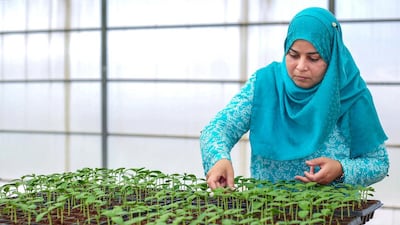DUBAI // Young Arab women studying agriculture will be offered a development programme that will hopefully enable them to improve the region’s food security.
Tamkeen, also known as the Young Arab Women Scientists Leadership programme, will focus on mentoring women who are studying agriculture at university to deal with challenges faced by female farmers.
It was developed by Dubai’s International Centre for Biosaline Agriculture.
“Women are under-represented in our field,” said Dr Henda Al Mahmoudi, 41, a Tunisian PhD graduate in plant biology.
“They have a lot of challenges and there is no encouragement, so programmes like these are good initiatives to put women from different regions in touch because networking in science is so important.”
The female labour force in Middle East agriculture grew from 34 per cent in 1995 to almost 45 per cent in 2011.
“Women constitute half of society,” said Seta Tutundjian, a director at the centre. “We bring a different perspective, we complement the men and it’s always good to have both sides because they both look at it in a different way.
“Women constitute a large portion of labourers in these fields. They cook the food and feed children so they help to bring a perspective that is different.”
The programme is in a six-month design phase. Countries involved include the UAE, Oman, Palestine, Jordan, Lebanon, Egypt, Tunisia and Morocco.
“A big part of the centre is working on issues of food and water security in the region and these two topics are huge challenges,” said Rana Askoul, Tamkeen’s lead consultant.
Ms Askoul said women were under-represented at all levels, from farmers and field workers to scientists, researchers and policymakers.
“So you have this mismatch in the sense that people on the ground aren’t finding partners who can match particular problems they’re facing.
“Women don’t lead research institutes or policy advisory positions on these issues, which is why we’re trying to address this shortage of women represented at these levels.
“We hope it will give them a platform to grow their career as scientists and policymakers.”
The centre plans to conduct focus groups in the UAE, Jordan and Morocco in the coming weeks to find out the challenges facing women. It is also working with universities to assess the skills taught to students.
“Based on these results, we’ll be bringing in a team to design the programme for young Arab women,” said Ms Tutundjian.
“We will pilot this programme for them to go through and see what their feedback is, and tweak it to meet their expectations before launching into implementation phase by spring-summer 2017.”
Dr Al Mahmoudi, who has two children, hopes the programme will encourage others to finish their studies and build a career in the field. “What’s important is to have knowledge, not just for themselves but to teach the next generation about the importance of sustainable agriculture for the future,” she said.
“This is the future. Without agriculture, there is no food, no healthy soil and no healthy life. With the scarcity of water and the deterioration of soil as well as climate change, all these components are very important for the future generation.”
cmalek@thenational.ae

